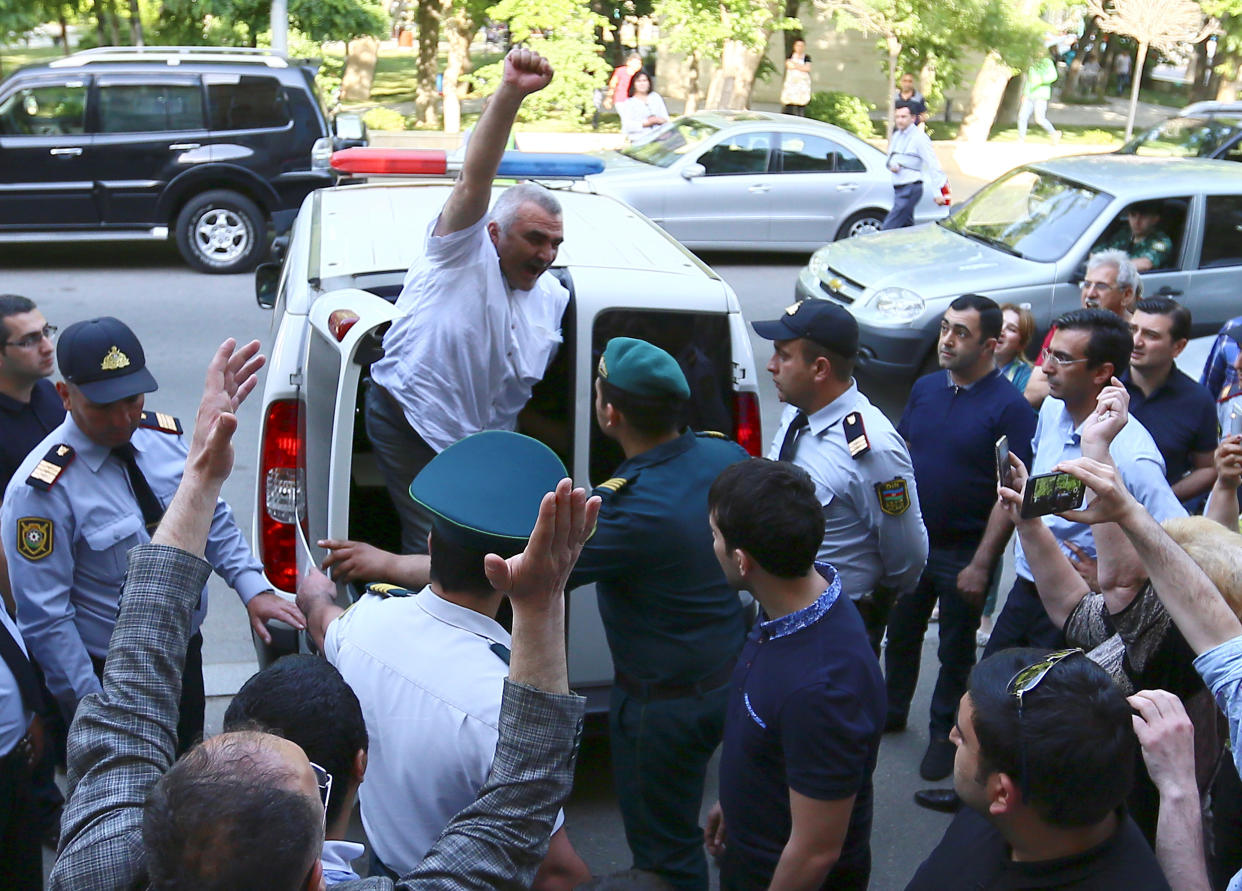One Free Press Coalition's '10 Most Urgent' list, October 2019

Yahoo News is a member of the One Free Press Coalition and is publishing the group’s latest “10 Most Urgent” list below to highlight the increasingly dangerous climate for journalism and free expression around the world in an effort to roll back repressive anti-press policies.
1. Jamal Khashoggi (Saudi Arabia)
One year without resolution in high-profile, brazen Khashoggi killing. As of Oct. 2, one year has passed without justice or resolution for the death of Washington Post columnist and Virginia resident Jamal Khashoggi, who was killed inside Istanbul’s Saudi consulate. The U.S. executive branch and U.N. have not gotten involved, despite a congressional call for investigation and CIA findings pointing blame at Saudi Arabia’s crown prince.
2. Afgan Mukhtarli (Azerbaijan)
Journalist with diabetes on hunger strike in Azerbaijan prison. In September, journalist Afgan Mukhtarli, who has type 2 diabetes, went on a hunger strike in protest of Azerbaijan prison conditions. His six-year prison sentence began in January 2018, after authorities abducted the reporter in Georgia and charged him with illegally crossing the border and carrying contraband. He had been living in exile in Georgia since 2014 because of death threats in relation to his investigative reporting on corruption.
3. Abduljalil Alsingace (Bahrain)
Urgent medical attention needed for Bahrain blogger serving life sentence. Jaw Central Prison has continually denied critical medical treatment (as well as prescriptions, toiletries and hygienic products) for Abduljalil Alsingace, who has daily chest pain and was sentenced in June 2011 to life imprisonment for “plotting to topple the monarchy.” One of several high-profile government critics arrested for pro-reform protests, Alsingace had written critically about human rights violations, sectarian discrimination and repression of the political opposition on his blog, Al-Faseela (Sapling).
4. Marzieh Amiri (Iran)
Imprisoned Iranian reporter has epilepsy and deteriorating health. Last month Iranian authorities allowed Marzieh Amiri a hospital visit to monitor epilepsy, after she had been denied proper medical attention in the months since her arrest for covering May Day demonstrations for the Tehran-based newspaper Shargh Daily. Family members were not allowed contact during the medical care and were responsible for the bill. In August, Tehran sentenced Amiri to 10 and a half years in prison and 148 lashes for charges of “assembly and collusion against national security,” “propaganda against the state” and “disturbing public order.”
5. Azimjon Askarov (Kyrgyzstan)
Kyrgyz journalist’s health worsens after nine years in prison. In addition to his deteriorating health and limited access to medication, Azimjon Askarov’s letters home from prison have noted punishment for detainees after visiting days. The ethnic Uzbek award-winning journalist has served nine years of a life sentence for reporting on human rights violations. In July, a Kyrgyz court ruled to uphold the term despite persistent international condemnation.
6. Jesús Medina (Venezuela)
Imminent court date for Venezuelan photographer jailed one year without trial. Freelance photographer Jesús Medina has an Oct. 3 court appearance, after serving more than a year in the Ramo Verde military prison pretrial. Venezuela has charged him with criminal association and inciting hate. Medina has faced harassment previously while reporting.
7. Austin Tice (Syria)
No answers after seven years in case of U.S. freelancer missing in Syria. Seven years ago, American freelance journalist Austin Tice went missing in Syria. The Georgetown University law student had spent the summer of 2012 reporting on civilian life during the country’s civil war and was detained at an automobile checkpoint. Tice’s family and the U.S. State Department are under the assumption that Tice is still alive despite his unknown whereabouts.
8. Mahmoud Hussein Gomaa (Egypt)
Nearly three years of imprisonment sans trial for Egyptian Al Jazeera journalist. For more than 1,000 days, Mahmoud Hussein Gomaa has served pretrial detention in Cairo’s Tora prison complex. The journalist was arrested on Dec. 23, 2016, on anti-state and false news charges, following an Al Jazeera documentary about conscription in Egypt. No trial date had been set as of late 2018, according to his daughter and the local press freedom group Egyptian Observatory for Journalism and Media.
9. Azory Gwanda (Tanzania)
Almost two years of uncertainty regarding Tanzanian journalist’s condition. A freelance journalist investigating mysterious killings in rural Tanzania, Azory Gwanda has been missing since Nov. 21, 2017. The government has failed to conduct a credible investigation or disclose what it knows. On July 10, Tanzanian Foreign Minister Palamagamba Kabudi said in an interview that Gwanda had “disappeared and died” but backtracked amid requests for clarification.
10. Hajar Raissouni (Morocco)
Personal matters cited as reason for Moroccan reporter’s arrest. Moroccan authorities are employing journalists’ personal information as grounds for arrest, as in the case of Hajar Raissouni, a reporter for independent news website Akhbar al-Youm. She was taken into custody on Aug. 31 while leaving her doctor’s office with her fiancé, charged with sex outside of marriage and illegal abortion. She then endured questioning about her political writing and connection to a newspaper colleague.


